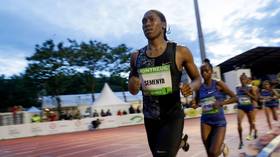We must not allow Caster Semenya’s case to be hijacked by trans athletes who want to compete against women

Runner Caster Semanya has been told she must take drugs to lower her testosterone to compete in the Olympics. Trans athletes say they should be allowed to do the same, but this would ignore their many other physical advantages.
It’s hard not to feel sympathy for South African athlete Caster Semenya. Whereas most Olympic-contenders dedicate themselves to training, Semenya’s energy is diverted into fighting court cases and mounting legal challenges in order to be able to compete at all.
This week, the double Olympic champion middle-distance runner lost the latest round in her long-running legal battle against the Court of Arbitration for Sport. And now, her fight to run is being politicised by transgender activists. Tragically, Semenya’s case is being exploited by trans-women determined to compete as females.
Semenya is a woman; she was born and raised female. However, after questions over her sporting success led to medical tests, it was discovered that she has a condition called androgen insensitivity syndrome (AIS).
AIS occurs in the womb; it affects the development of a fetus’s genitals and reproductive organs, resulting in babies born genetically male but with female genitalia. AIS is thought to affect between 2 and 5 in every 100,000 people making it a very rare condition. As a result of AIS, Semenya has naturally higher levels of testosterone than most women.
Also on rt.com LGBT champions Stonewall UK call to secure place for trans athletes in female rugby, while shutting off angry commentsThe extent to which raised testosterone levels give Semenya an advantage when competing alongside female athletes is being decided in the courts rather than on the running track. It was the International Association of Athletics Federations (IAAF) that first insisted Semenya take genetic tests; it then imposed rules insisting that athletes with ‘differences of sex development’ artificially lower their natural testosterone levels. Last year, the Court of Arbitration for Sport upheld the IAAF’s ruling.
This week, a Swiss federal tribunal ruled against Semenya and backed the Court of Arbitration for Sport. Now, in order to compete at next year’s Olympics, Semenya will have to take drugs to lower her testosterone level to below the limit set for female athletes. World Athletics has welcomed this decision as “a legitimate and proportionate means of protecting the right of all female athletes to participate in our sport on fair and meaningful terms.” But is it?
The IAAF ruling defines female competitors solely according to their testosterone levels: above a certain level and you compete with the men, below that and you line up alongside the women. Far from protecting the rights of female athletes, this opens the door for male-bodied trans-women keen to take part in women’s sports and more than happy to take the required drugs.
Australian trans athlete Hannah Mouncey has played handball for the national men’s and women’s team. Mouncey said of the ruling on Semenya’s case: “Intersex athletes are different to trans athletes and for an intersex athlete this is naturally occurring testosterone. She is female, what are they going to do – ban seven-foot basketballers [because they have a physical advantage]?”
Also on rt.com The trans ideology of less than 1% of the UK population has bullied the other 99%. Here’s why I, as a real woman, reject itMouncey is right. There is a huge distinction between naturally raised testosterone levels and men reverse-doping to compete as women. Clearly, if having AIS - and naturally high testosterone levels - was all it took to achieve Olympic success, then there would be far fewer female athletes lining up to compete. Even CAS recognises that there is a lack of evidence as to how big an advantage natural testosterone might provide.
Mouncey went on to say that the Swiss court’s judgement was an acknowledgment that the key difference between male and female athletes was testosterone level and that the ruling implies that if male-bodied athletes lower their testosterone levels, they have no advantage when competing alongside female athletes. This, as Mouncey points out, is what the transgender community has been arguing for years.
But biological sex is about more than testosterone levels: men are, on average, likely to be taller, stronger, heavier and have a larger lung capacity than women. Transgender women may undergo genital surgery and take drugs to lower their testosterone levels. But they will still be taller, stronger and heavier than females. They will still have men’s bodies.
Also on rt.com Mob ‘justice’: How one feminist’s simple Tweet enraged transgender activists and saw her sacked from her dream jobHeight, weight and strength are - just like testosterone levels - on a spectrum. Depending upon the sport, each of these attributes provides athletes with a natural advantage over their competitors. Sex, on the other hand, is binary. Crucially, if I take testosterone tablets tomorrow I will not magically transform into a man.
The multiple legal wrangles and court cases Semenya has found herself embroiled in speak to society’s confusion over the significance of sex and how to define ‘men’ and ‘women’ today.
The Swiss court’s judgement is unfair to Semenya, who seems uniquely and arbitrarily singled out, and it is unfair to women who now risk having their sporting events opened up to any man who can reverse-dope low testosterone levels.
Semenya said: “Excluding female athletes or endangering our health solely because of our natural abilities puts World Athletics on the wrong side of history. I will continue to fight for the human rights of female athletes, both on the track and off the track, until we can all run free the way we were born.” Good luck to her.
Think your friends would be interested? Share this story!
The statements, views and opinions expressed in this column are solely those of the author and do not necessarily represent those of RT.














